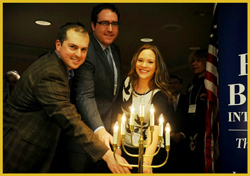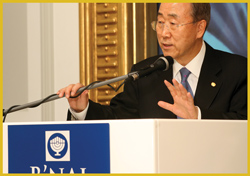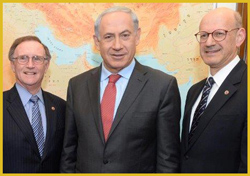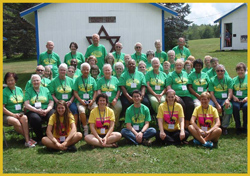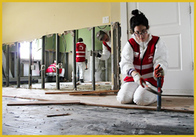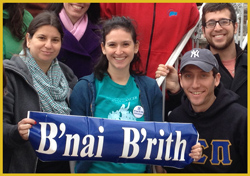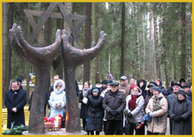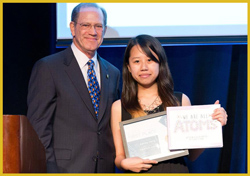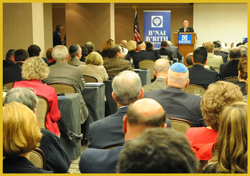B’nai B’rith continues to monitor global human rights issues and work through interfaith coalitions to ensure tolerance and respect for all religions.
A delegation of leaders from B’nai B’rith International—including members of the Young Leadership Committee—met with U.N. Secretary-General Ban Ki-moon on March 20, 2013, to discuss such pressing issues as Israel’s treatment at the United Nations, the growing nuclear threat Iran poses to the world and the situation in Syria, among other subjects. Later in the year, our leaders met with presidents, prime ministers, foreign ministers and other senior officials attending the opening of the 68th United Nations General Assembly, where we discussed the urgent challenge posed by Iran, the civil war in Syria, a resumption of Israeli-Palestinian peace talks and continued bias against Israel within agencies of the United Nations, not least its Human Rights Council (UNHRC). While B’nai B’rith leaders were meeting government officials in New York, our representative in Geneva delivered a formal statement at the council condemning the body for its unabated fixation on Israel, even as Arab civilians suffer grievously in Syria and other countries in the Middle East.
We continue to be a vocal supporter of tough sanctions against Iran as a means to stop the Tehran-based regime from advancing its nuclear weapons program. In direct meetings and official letters, we have called on nations around the world to enact the strongest possible sanctions against Iran, the largest state-sponsor of global terrorism. B’nai B’rith has called on the United States and its allies to ramp up all forms of pressure on Iran as the regime continues to delay and dissemble.
As we have done almost from our founding, B’nai B’rith tirelessly battles anti-Semitism. Through regular exchanges with the U.S. State Department and foreign governments, along with our cooperation with the Organization for Security and Co-operation in Europe and the Organization of American States, we fight to ensure anti-Semitism is brought into public view and deemed unacceptable. B’nai B’rith participated this year in international conferences on anti-Semitism in Poland, Germany and Israel.
A delegation of leaders from B’nai B’rith International—including members of the Young Leadership Committee—met with U.N. Secretary-General Ban Ki-moon on March 20, 2013, to discuss such pressing issues as Israel’s treatment at the United Nations, the growing nuclear threat Iran poses to the world and the situation in Syria, among other subjects. Later in the year, our leaders met with presidents, prime ministers, foreign ministers and other senior officials attending the opening of the 68th United Nations General Assembly, where we discussed the urgent challenge posed by Iran, the civil war in Syria, a resumption of Israeli-Palestinian peace talks and continued bias against Israel within agencies of the United Nations, not least its Human Rights Council (UNHRC). While B’nai B’rith leaders were meeting government officials in New York, our representative in Geneva delivered a formal statement at the council condemning the body for its unabated fixation on Israel, even as Arab civilians suffer grievously in Syria and other countries in the Middle East.
We continue to be a vocal supporter of tough sanctions against Iran as a means to stop the Tehran-based regime from advancing its nuclear weapons program. In direct meetings and official letters, we have called on nations around the world to enact the strongest possible sanctions against Iran, the largest state-sponsor of global terrorism. B’nai B’rith has called on the United States and its allies to ramp up all forms of pressure on Iran as the regime continues to delay and dissemble.
As we have done almost from our founding, B’nai B’rith tirelessly battles anti-Semitism. Through regular exchanges with the U.S. State Department and foreign governments, along with our cooperation with the Organization for Security and Co-operation in Europe and the Organization of American States, we fight to ensure anti-Semitism is brought into public view and deemed unacceptable. B’nai B’rith participated this year in international conferences on anti-Semitism in Poland, Germany and Israel.
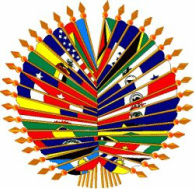
Our vigilance and our long term view of global situations paid off big in June, when the Inter-American Convention against All Forms of Discrimination and Intolerance, and the Inter-American Convention Against Racism, Racial Discrimination and Related Forms of Intolerance were approved by the Organization of American States’ (OAS) General Assembly in Antigua, Guatemala.
B’nai B’rith staff in Latin America and the United States pressed political leaders across Latin America for nearly a decade to adopt these clear guidelines for combating hate speech and racial discrimination. And it was through our efforts that anti-Semitism is specifically acknowledged as a form of discrimination. B’nai B’rith was able to bring our depth and breadth of knowledge to get these important tools passed.
B’nai B’rith staff in Latin America and the United States pressed political leaders across Latin America for nearly a decade to adopt these clear guidelines for combating hate speech and racial discrimination. And it was through our efforts that anti-Semitism is specifically acknowledged as a form of discrimination. B’nai B’rith was able to bring our depth and breadth of knowledge to get these important tools passed.
|
We have long been concerned over the plight of the nearly one million Jews displaced from their homes in Arab and Muslim nations as a result of Middle East conflict. There is often discussion about whether or not Arabs were displaced when Israel was formed, but no acknowledgment of Jewish displacement from Arab nations. B’nai B’rith International played a pivotal role in drafting a bipartisan measure before Congress that would recognize the injustice to Jews who lost their homes in the Arab world. Under the bill, the State Department would be required to report to Congress on measures it has undertaken to advance the rights of these refugee populations, who have been largely abandoned by the international community.
As the UNHRC in Geneva continues to single out Israel for condemnation, B’nai B’rith speaks out forcefully with the facts. Our representative to the United Nations in Geneva spoke before the UNHRC addressing the anti-Israel bias that has consumed the council, its latest reports and resolutions. During the spring council session in Geneva, B’nai B’rith International sent its annual leadership delegation—including several young leaders—to address key issues, including the council’s continued obsessive negative focus on Israel, Iran’s appalling domestic human rights record and its repeated threats against Israel, and the devastating fighting in Syria. |
|
Our long-standing commitment to interfaith dialogue and understanding was again on display in June when B’nai B’rith leaders attended the first official audience Pope Francis held for international Jewish community leaders. The B’nai B’rith leaders were part of a group from the International Jewish Committee for Interreligious Consultations (IJCIC), the long-standing Jewish representative group for Catholic-Jewish relations. In March, B’nai B’rith took part in an interfaith meeting at the Vatican with Pope Francis, one day after his formal installation.







